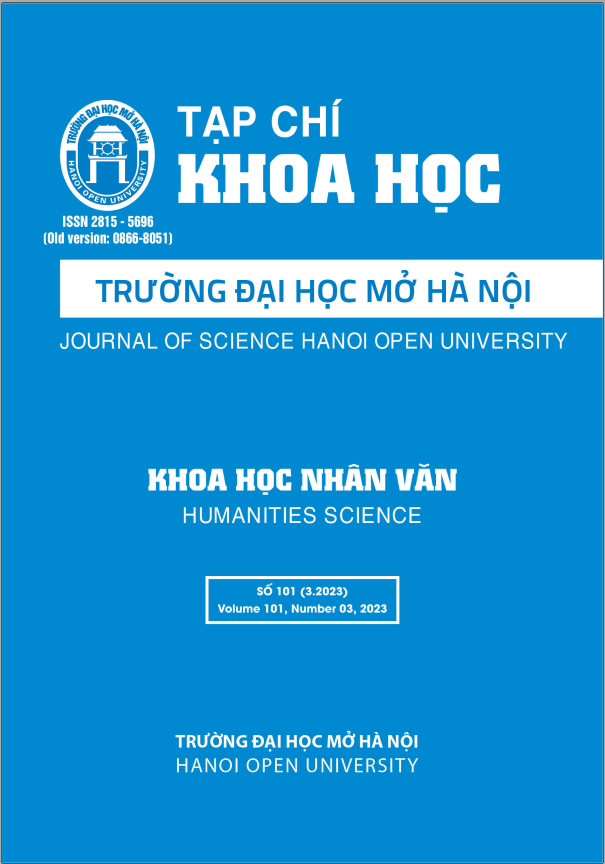THEORETICAL FRAMEWORK OF KNOWLEDGE SHARING ACTIVITIES IN UNIVERSITIES
Từ khóa:
knowledge sharing, universities, theoretical frameworkTóm tắt
Knowledge production is part of universities and knowledge sharing is tremendously vital in this regard. As the universities becoming intercontinental and diversified, knowledge is the core competitiveness, and it also the fundamental resources to create value which is to improve the educational quality. Knowledge sharing in universities is followed by numerous researches, however, literature has not been providing an infinite picture or plentiful analysis related to process of knowledge sharing activities in university. The main purpose of the paper is to provide a systematic theoretical framework for the process of knowledge sharing activities in university in term of subjects, channels, motivations, barriers and conditions.
Tài liệu tham khảo
[1]. Alavi, M. and Leidner, D.E. (2001). Review: Knowledge management and knowledge management systems: conceptual foundations and research issues. MIS Quarterly Vol. 25 No.1, pp107-136.
[2]. Becheikh, Nizar et al (2010). How to improve knowledge transfer strategies and practices in education? Answers from a systematic literature review. Research in Higher Education Journal. 7.
[3]. Biloslavo, R. & Trnavcevic. (2007). A Knowledge Management Audit in a higher educational Institution: A Case Study. Knowledge and Process Management, 14(4) 275-286.
[4]. Boer, N.I. & Baalen, P. J. & Kumar, K. (2002). The Importance of Sociality for Understanding Knowledge Sharing Processes in Organizational Contexts. Erasmus Research Institute of Management (ERIM),
[5]. Davenport, T.H. and Prusak, L. (1998). ‘Working knowledge: How organization manage what they know’. Havard Business School Press, 23-76.
[6]. De Long, David and Fahey, Liam. (2000). Diagnosing Cultural Barriers to Knowledge Management. Academy of Management Executive. 14. 113-127.
[7]. Deci, E.L. and Ryan, R.M. (2000), “The “”What”” and “”Why”” of Goal Pursuits: Human Needs and the Self‐Determination of Behavior””, Psychological Inquiry, Vol. 11 No. 4, pp. 227‐68.”
[8]. Dhamdhere, S.N. (2015). Importace of knowledge management in the higher educational institutes. Turkish Online Journal of Distance Education-TOJDE January 2015 ISSN 1302-6488 Volume: 16 Number: 1 Article 11
[9]. Drucker, P. F. (1993). Post-Capitalist Society (1st ed.). Routledge. Edmonson, R. R. (2010). Knowledge management practices within Hong Kong organizations.
[10]. Evans, M. (2012). Knowledge Sharing: An empirical study of the role of trust and other social-cognitive factors in an organizational setting. Doctor of Philosophy thesis, Faculty of Information, University of Toronto
[11]. Foss, N., Husted, K. and Michailova, S. (2010). Governing Knowledge Sharing in Organizations: Levels of Analysis, Governance Mechanisms, and Research Directions. Journal of Management Studies 47:3.
[12]. Gates, B. (2000). Remarks by Bill Gates. Intel eXCHANGE e-Business Conference San Francisco, Calif. October 12.
[13]. Gebreyohans, G., Croasdell, D. and Meshesha, M. (2022). A Systematic Literature Review on Digital Knowledge Sharing in Higher Education. Proceedings of the 55th Hawaii International Conference on System Sciences
[14]. Grant, R. M. (1996). Toward a knowledge-based theory of the firm. Strategic Management
[15]. Journal, 17(Special Issue), 109–122.
[16]. Gurteen, D. 1999. Creating a knowledge sharing culture. Knowledge Management Magazine 2(5).
[17]. Hung, S.‐Y., Lai, H.‐M. and Chang, W.‐W. (2011), “Knowledge‐sharing motivations affecting R&D employees’ acceptance of electronic knowledge repository”, Behaviour & Information Technology, Vol. 30 No. 2, pp. 213‐30.
[18]. Janus, Steffen (2016). Becoming a Knowledge-Sharing Organization: A Handbook for Scaling Up Solutions through Knowledge Capturing and Sharing. Washington, DC.
[19]. Kashari, Zainab and Taheri, Fatma (2019). The Role of Knowledge Sharing in Organizational Performance. American Scientific Research Journal for Engineering, Technology, and Sciences (ASRJETS) Volume 62, No 1, pp 30-38.
[20]. Mahamed Ismail, A. (2012). Key Determinants of Research-Knowledge Sharing In UK Higher Education Institutions. Doctor of Philosophy thesis at the University of Portsmouth
[21]. Obrenovic, B. and Obrenovic, S. and Khudaykulov, A. (2015). The value of knowledge sharing: impact of tacit and explicit knowledge sharing on team performance of scientists. International Journal of Manangement Science and Business Administration.
[22]. Pulakos, E. D., & Dorsey, D. W., and Borman, W. C., 2003. Hiring for knowledge- based competition, managing knowledge for sustained competitive advantage: Designing strategies for effective human resource management, pp. 155-177.
[23]. Ramanujan, S., & Kesh, S. (2004).Comparisonofknowledgemanagement and CMM/CMII implementation. The Journal of American Academy of Business, Cambridge, 4(1/2), 271-277.
[24]. Tiwana, Amrit (2002). Knowledge Management Toolkit, The: Practical Techniques for Building a Knowledge Management System. Prentice Hall PTR Publisher. ISBN:0-13-012853-8, 640 pages
[25]. Tsui, L. et al. (2006). A Handbook on Knowledge Sharing: Strategies and Recommendations for Researchers, Policymakers, and Service Providers. Community-University Partnership for the study of Children, Youth and Familles
[26]. Yang, Xiaohui (2013). Study on knowledge sharing machanism of university teachers in information age. International Conference on Education Technology and Information System (ICETIS).
[27]. Yeşil, S. and Hatunoğlu, M. (2019). Knowlegde Sharing Attitude: An Exploratory Study among University Students. Journal of International Cooperation and Development. Vol 2, No 2.
[28]. Zainuddin, A., Haron, H., Noordin, S.A., Hashim, D.M., Sahid, N.Z. & Johari, M.K. (2004). Knowledge management practices in academic institution: a proposed concept. Proceedings of Knowledge management International Conference 2004. Malaysia: UUM.
